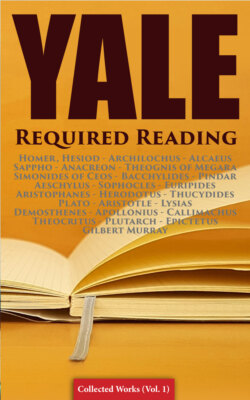Читать книгу Yale Required Reading - Collected Works (Vol. 1) - Anacreon - Страница 128
На сайте Литреса книга снята с продажи.
The Life and Work of Sappho
ОглавлениеTable of Contents
SAPPHO -- the name is variously spelt; there is authority for Psappha, Psaffo, and even Pspha -- born at Ephesus, dwelling at Mitylene, shared the political fortunes of Alcæus's party. We hear of a husband, whose name, Kerkylas of Andros, is not above suspicion; and of a daughter Kleïs, whose existence is perhaps erroneously inferred from a poem -- "I have a fair little child, with a shape like a golden flower, Kleïs, my darling." She seems to have been the leader of a band of literary women, students and poetesses, held together by strong ties of intimacy and affection. It is compared in antiquity2 to the circle of Socrates. Sappho wrote in the most varied styles -- there are fifty different metres in our scanty remains of her -- but all bear a strong impress of personal character. By the side of Alcæus, one feels her to be a woman. Her dialect is more the native speech of Mitylene, where she lived; his the more literary. His interests cover war and drinking and adventure and politics; hers are all in personal feeling, mostly tender and introspective. Her suggestions of nature -- the line, "I heard the footfall of the flowery spring";the marvellously musical comparison, "Like the one sweet apple very red, up high on the highest bough, that the apple-gatherers have forgotten; no, not forgotten, but could never reach so far"-- are perhaps more definitely beautiful than the love-poems which have made Sappho's name immortal. Two of these are preserved by accident; the rest of Sappho's poetry was publicly burned in 1073 at Rome and at Constantinople, as being too much for the shaky morals of the time. One must not over-estimate the compliments of gallantry which Sappho had in plenty: she was 'the Poetess' as Homer was 'the Poet'; she was 'the Tenth Muse,' 'the Pierian Bee'; the wise Solon wished to "learn a song of Sappho's and then die." Still Sappho was known and admired all over Greece soon after her death; and a dispassionate judgment must see that her love-poetry, if narrow in scope, has unrivalled splendour of expression for the longing that is too intense to have any joy in it, too serious to allow room for metaphor and imaginative ornament. Unfortunately, the dispassionate judgment is scarcely to be had. Later antiquity could not get over its curiosity at the woman who was not a 'Hetaira' and yet published passionate love-poetry. She had to be made a heroine of romance. For instance, she once mentioned the Rock of Leucas. That was enough! It was the rock from which certain saga-heroes had leaped to their death, and she must have done the same, doubtless from unrequited passion! Then came the deference of gallantry, the reckless merriment of the Attic comedy, and the defiling imagination of Rome. It is a little futile to discuss the private character of a woman who lived two thousand five hundred years ago in a society of which we have almost no records. It is clear that Sappho was a 'respectable person' in Lesbos; and there is no good early evidence to show that the Lesbian standard was low. Her extant poems address her women friends with a passionate intensity; but there are dozens of questions to be solved before these poems can be used as evidence: Is a given word-form correct? is Sappho speaking in her own person, or dramatically? what occasion are the verses written for? how far is the poem a literary exercise based on the odes written by Alcæus to his squire Lykos, or by Theognis to Kyrnus?
2 Maximus Tyrius.
